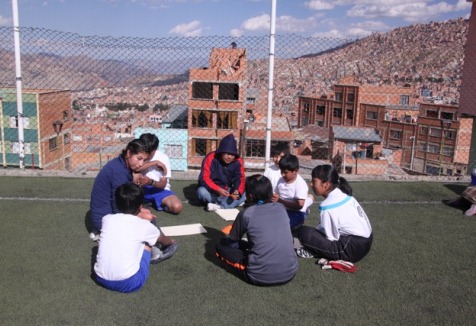Building Bolivia: constructing child-friendly cities

Experiencing the reality of children's lives in Bolivia can be very confronting. Many children in the most disadvantaged communities and rural villages attend school for only a few hours each day and spend much of their spare time helping to support their families by minding siblings, working in small family businesses or completing domestic chores inside or outside the home — and home is usually a small, cramped house with no privacy. When there is time for play, the environments the children go to are often polluted and unsafe, on unstable cliff faces at risk of land or mud slides.
This year, Karen Malone, Professor of Education in the School of Education, commenced project work to create much-needed child-friendly cities in this Latin American country. Karen's work aims to support UNICEF and local municipalities in designing research projects to explore children's experiences of growing up in some of the most challenging districts within the capital city of La Paz. The projects will use qualitative research techniques such as hands-on field workshops, which have not been done in this area before.
Around 40 per cent of Bolivia's population is under 18 years old. "This research is important because little or no research has been conducted in the country about the quality of children's lives nor has there been engagement with children about their own desires and dreams for the future," says Karen. "There is an enormous silence that the research can begin to fill. Bolivia is one of the poorest yet culturally rich countries in Latin America and little or no research has been done with children and their families on how this is impacting their lives."
Once the information has been collected, it will be used to inform policy at the Municipal level and national level. "It will support policy makers to develop long and short action plans and strategies that provide the pathways to move forward to improve the lives of children and to implement key principles within the Convention on children's rights."
In providing the impetus to build child-friendly cities and communities, the project aims to improve the lives of children by recognising their rights and transforming their communities.
For more information on Karen's project, contact Karen.
Mobile options:

